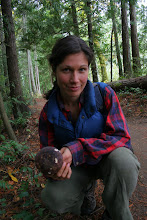





25% Norwegian, 25% Italian, 25% Czech,
12.5% German, 12.5% Swedish
All-American? (couldn't resist)
So that's my break-down. If I were a dog, there would be little questioning my "mutt" status. But that's a reality that I'm certainly not alone in - and it's nothing to feel bad about.
So why do I feel badly about it sometimes?
When I travel, I love it when people mistake me as a German, Austrian, Israeli. Even though they're completely incorrect, it feels good to be recognized as from somewhere.
Of course, the United States is somewhere. But I feel like it gives so little to cling to in terms of a cultural identity that me being an American means very little. I know that these feelings are due in part to the fact that it can be difficult at times to see and identify my own culture in my daily life. Particularly when that daily life doesn't have a clear set of rituals - religious or otherwise - to act as cultural markers. And the idea that my ancestors come from places other than America, some from places whose borders have shifted and names have changed is also one that makes finding - and feeling - a cultural identity a murky challenge.
I went to hear Heidi Bohan, a very inspiring PNW ethnobotanist, speak a few weeks ago. She addressed this idea of attempting to identify with your ancestry. The focus of her work has been various Native tribes in the Cascadia area and the plants, animals and fibers they made use of. In her work, she has made incredible replicas of the fishing nets, the baskets, the cat-tail mats, etc that the First Nations people in our area made throughout the year. Looking at Heidi, however, it's obvious that she is not a Native-American. She was at one point married to a member of the Haida Tribe, but is herself of Scottish origins.

Heidi spoke about how, all-too-often, it is the spiritual side of Native-American culture that non-native people try to understand and incorporate. She argued that this information, these practices and understandings, aren't ours to take and use; they don't belong to us. While I'm still processing that concept (and find myself leaning towards agreeing with it), I can certainly find truth in what she said next: The land is ours to learn. And we can get to know ourselves by getting to know the surrounding earth and the plants and animals that live on and in it. She herself has found connections between her Scottish roots and Native traditions in their shared reverence for salmon and salmon's presence in the folklore of both cultures, for example.
Her talk got me excited to explore my past cultural roots and strengthen my currents ones too. I have felt attached to the ecology of this area since I first moved here nearly 5 years ago, and I do feel that building on my relationship with the land and plants and animals here is a way to grow in my understanding of myself. Another way I've come to know and challenge myself is through creating things - and Heidi was hugely inspirational in this too (in the sort of way that left me almost petrified by how awesome and resourceful she is).
So my next project is to see a hat from start to finish: raw wool to knitted hat. And while I didn't shear the alpaca myself, I am going to spin the wool roving into yarn, dye the yarn (I'm thinking yellow .... possible dyeing sources include onion skins, turmeric or Oregon Grape bark), and knit the hat. In lieu of a spinning wheel, I'm using a drop spindle - an affordable and relatively easy alternative.
Here's what I have so far:



Okay, I know this post was a long one. If you've stayed on this long, thanks - and I'd love to hear how you're answering these questions for yourself. Where do you come from? And what does trying to answer that question mean to you or make you feel?
Ecological sustainability requires a patient and systematic effort to restore and preserve traditional knowledge of the land and its functions. This is knowledge of specific places and their particular traits of soils, microclimates, wildlife and vegetation, as well as the history and the cultural practices that work in each particular setting. Sustainability comes from the careful adaptation of people to particular places. This is as much a process of rediscovery as it is of research. David Orr

I saw Heidi speak during my time with the native plant society--she is a powerful voice.
ReplyDeleteYou- have a powerful voice. Its lovely to read your thoughts (regardless of how edited they may be). Thanks for thinking outloud.
I am quite thrilled to see your hat.
I am quite thrilled to see your face- whenever that happens next.